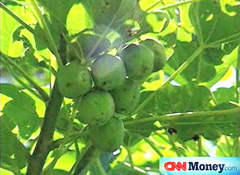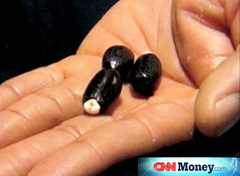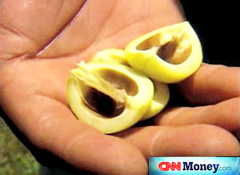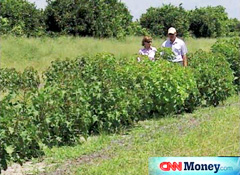
Jatropha berries1 |
Jatropha originated in Central America and is believed to have been spread around the world by Portuguese explorers.2 The abundant oil present in the plant's poisonous seeds has traditionally been used to make soap and primitive medicinals, but early this century an interest developed in the cultivation of Jatropha as a source of biofuel.2
In 2008, Air New Zealand flew a Boeing 747 for 12 hours, fueling one of its four engines with a mixture containing 50% of biofuel derived from the triglycerides extracted from the seeds of Jatropha plants.3 The success of this demonstration sparked intense interest and speculation both in aviation and agricultural circles, and soon China4 and other countries were conducting test flights using Jatropha-based biofuel blended with conventional jet fuel.5 At the same time, Africa, with its vast undeveloped lands, became the target of entities eager to establish an early foothold in the potential market for Jatropha-based biofuels.6,7
 Jatropha seeds1 |
Several groups have voiced concerns about potential environmental dangers posed by the production of biofuels from plants such as Jatropha.8 While claims of excessive carbon emissions from biofuels appear to be unfounded, there is widespread acknowledgement that success of a plant-based biofuels industry could effectively compete with food-based agriculture, and particularly impact poorer countries that traditionally have been vulnerable to food shortages. Despite such fears, in Ghana alone, for example, companies from Italy, Israel, India and Norway by 2011 had acquired approximately 1.4 million acres for the cultivation of Jatropha for biodiesel production, and companies from the Netherlands and China had started pilot projects there.8 An American firm already had acquired 5 million acres in that country.7,8

Jatropha seed husks1 |
In response to the recent volatility in the price of fossil-derived oil, speculators who were once eager to invest in Jatropha-derived biofuel production withdrew their support when it became clear that the returns they expected would not materialize. Such pessimism, however, was not universal, and at least one major American company not only persevered but engaged in the latest available scientific and entrepreneurial techniques to insure the success of its venture in Jatropha-based biofuel production.9
 Inspecting Jatropha plants in Florida1 |
A 2014 issue of BioFuels Digest10 included a summary of the major countries now engaged in the cultivation of Jatropha for the purpose of furnishing raw material to be refined into biofuel suitable for vehicles and farm equipment as well as for aviation.10 The primary factor influencing the world-wide scale of Jatropha-derived biofuel appears to be the high cost of its production relative to the price of fossil-derived oil extracted from the earth. However, with evolving efficiences in horticulture and biofuel production, and assuming a stabilization of oil prices, biofuels are destined to become an increasingly important segment of the liquid fuels industry.
References
- Photographed at the University of Florida, Hendry County Extension, Labelle, Florida, 2008. From the video: "A different kind of fuel plant," http://money.cnn.com/video/news/2008/08/12/news.dreamfuel.081208.cnnmoney/, accessed 1/11/2015. Images are reproduced in accordance with the "fair use" provision of Title 17 U.S.C. § 107 for a non-profit, educational purpose.
- Lydia Polgreen, "Mali's Farmers Discover a Weed's Potential Power," The New York Times, September 9, 2007.
- James Kanter, "Air New Zealand Flies on Engine with Jatropha Biofuel Blend," The New York Times, December, 30, 2008. Also: Air New Zealand Public Affairs, "Biofuel Test Flight Report Shows Significant Fuel Saving," Air New Zealand, May 28. 2009.
- James T. Areddy, "China's First Aviation Biofuel Test," The Wall Street Journal, November 1, 2011.
- Sonia Kolesnikov-Jessop, "Flying with Biofuel Gets One Step Closer," The New York Times, October 25, 2011.
- Emmanuel K. Dogbevi, "Land Grabbing for Biofuels Hits Ghana, Other African Countries - Report," Ghana Business News, August 30, 2010.
- Emmanuel K. Dogbevi, "Ghana Based Biofuels Firm Signs Contract with Energy Partners of Chile," Ghana Business News, December 30, 2008. Also: Emmanuel K. Dogbevi, "Gold Star to Cultivate Five Million Acres of Land for Biofuels in Ghana," Modern Ghana News, December 31, 2008.
- Emmanuel K. Dogbevi, "Jatropha as Biofuel Causes More Carbon Emissions - Report," Ghana Business News, March 22, 2011.
- Jennifer Alsever, "SGB's Jatropha Vision: Jet Fuel Grown from Seeds," CNN Money, November 26, 2012. Also: Todd Woody, "Start-Up Uses Plant Seeds for a Biofuel," The New York Times, December 24, 2013.
- Jim Lane, "Jatropha Around the World: As SGB Raises $11M, Here's a 13-Country Tour of Development Activity," Biofuels Digest, September 11, 2014.
|
|
|